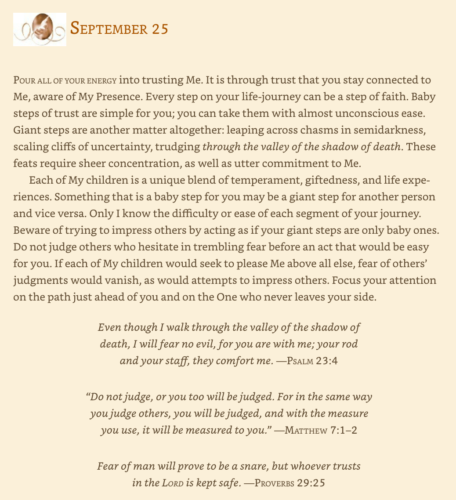Sacred Space
In a 1994 retreat on the Hebrew prophets for CAC interns, Richard Rohr stressed that the prophets’ love for God and passion for justice came from a transforming experience of “sacred space”:
Comparative religion scholar Mircea Eliade (1907–1986) describes sacred space and profane space. He identifies sacred space with an inbreaking of divine reality, and thinks that modern people have uneasy and weak connections to sacred space. [1] Since the Enlightenment, we live almost entirely in profane space. If we picture a circle as sacred space, inside the circle, there is one reference point, and everything bounces off of that center point.
Most of us have been inside sacred space before. It’s whenever something jolts us into the absolute now. It could be when we’re frightened to death, or it could be like the moment we received the call that our mother or father had just died. That’s sacred space. Sometimes it lasts for days or weeks, and it’s where everything is experienced in terms of that one reference point. We can’t think of anything else. After I heard my mother died, I went down to the local store, and I really wanted to shout narcissistically to everybody, “Why are you just going ahead with your business, don’t you know my mother died?!” We’re that caught up in this differently shaped universe. I really couldn’t believe why anybody else would be buying and selling things, because don’t they know the world has been rearranged? Maybe we’ve only experienced it for a second, but this sacred space is anything that pulls us to experience the Total Now.
The secret of the Hebrew prophets is they had a transforming experience of sacred space. The calls of Jeremiah, Isaiah, and Ezekiel each are a clear description of a transformative moment of sacred space. Their world is reconfigured, life is reconfigured, and afterwards they have to go back to what looks ordinary but now has become entirely extraordinary for them. They see reality with a different set of eyes. I think the reason that we need a place like the CAC or a school for prophets is because we’ve got to find a way to honor and send people on this serious search for God. That is primary, and it’s from this that we develop critical consciousness.
I don’t think this will ever be a grand agenda for a large amount of people, but I do think the prophetic gift can be educated, and I do believe the prophetic gift can be called forth. Once we start speaking about the prophets and naming the prophetic gift, a lot more people might recognize, “I might just have that gift now and then.” We don’t need to name ourselves as prophets, or for anyone else to call us prophets, but we can operate prophetically now and then. We can be radically committed to the big picture, the great tradition, while being free to critique it.
A Sense of Presence
Minister and author Howard Thurman (1899–1981) stressed the importance of coming face to face with God:
The central fact in religious experience is the awareness of meeting God. The descriptive words are varied: sometimes it is called an encounter; sometimes, a confrontation; and sometimes, a sense of Presence. What is insisted upon, however, … [is that] the individual is seen as being exposed to direct knowledge of ultimate meaning … in which all that the individual is, becomes clear as immediate and often distinct revelation. He is face to face with something which is so much more, and so much more inclusive, than all of his awareness of himself that for him, in the moment, there are no questions. Without asking, somehow he knows.
The mind apprehends the whole—the experience is beyond or inclusive of the discursive…. The individual in the experience seems to come into possession of what he has known as being true all along. The thing that is new is the realization. And this is of profound importance. [1]
Spending time with Quakers provided Thurman with sacred space to experience his oneness with God and other people. It proved to be a doorway to both action and contemplation. Author Lerita Coleman Brown writes:
For more than four hundred years, a vibrant Quaker commitment to the mystical practice of silence has persisted…. Staunch promoters of the “still small voice,” Quakers believe that everyone carries the divine light of God within them and that we are all equal regardless of title or socioeconomic status. They believe that God speaks ceaselessly to us and that quietness and stillness are prerequisites for hearing the soft, gentle, wordless communication of God. Yet for Quakers, being contemplative is not enough; they assume that actions emerging from the silence should facilitate the end of social injustices and the creation of a more benevolent world. As advocates of peace and equality, many Quakers participated in the Underground Railroad, assisting thousands in escaping slavery.
As part of his study of mysticism, Howard Thurman attended Quaker meetings and sat in the silence that characterizes unscripted forms of Quaker worship. In a 1951 sermon on the strength of silence in corporate worship … Thurman speaks of his personal experience of group silence during a traditional Quaker meeting:
Nobody said a word … just silence. Silence. Silence. And in that silence I felt as though all of them were on one side and I was on the other side, by myself, with my noise. And every time I would try to get across the barrier, nothing happened. I was just Howard Thurman. And then … I don’t know when it happened, how it happened, I wish I could tell you, but somewhere in that hour I passed over the invisible line, and I became one with all the seekers. I wasn’t Howard Thurman anymore; I was, I was a human spirit involved in a creative moment with human spirits, in the presence of God. [2]
